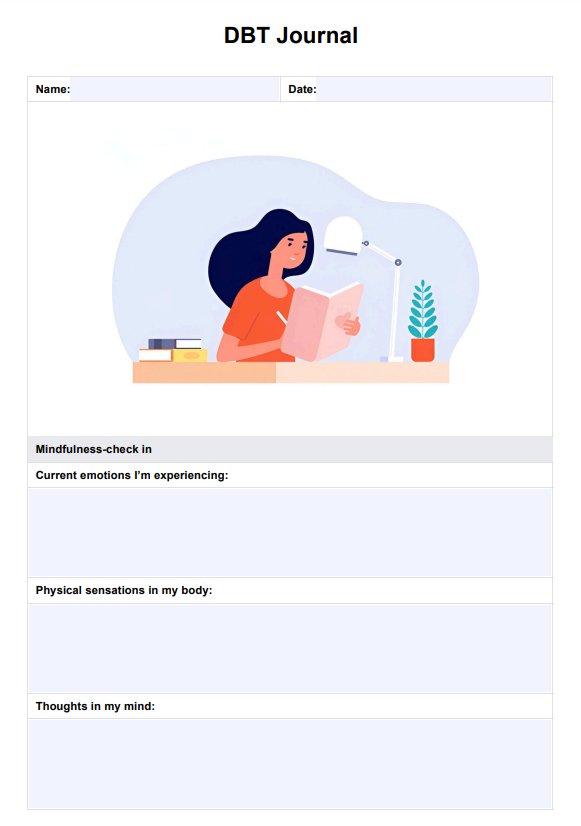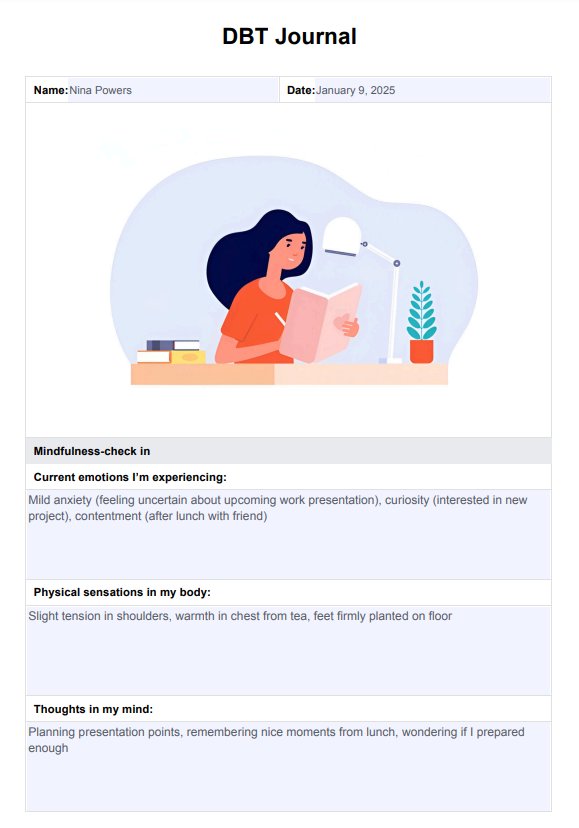DBT Journal
Help clients master emotional well-being with our comprehensive DBT Journal template to encourage self-reflection and develop lifelong skills.


What is the DBT Journal?
The DBT Journal or DBT skills daily journal, rooted in Dialectical Behavior Therapy (DBT), is an accessible practice designed to support mindful skills practice for individuals seeking to manage intense emotions and lead fulfilling lives. DBT is an approach formed by renowned mental health experts and consists of four core DBT skills: mindfulness, interpersonal effectiveness, emotion regulation, and distress tolerance.
This resource is a brief skills toolkit and a skill-learning journey, providing clients with a structured and facilitated manner to develop lifelong skills. The journal is particularly beneficial for those dealing with severe emotion regulation problems, as well as mental health disorders, offering a comprehensive approach to overall well-being.
Our DBT skills journal is designed for those new to journaling or DBT, for a DBT skills trainer, and for healthcare professionals who want to incorporate this into their client's therapeutic process. Its writing prompts and daily written reflections guide users to build greater self-awareness, manage overwhelming emotions, and cultivate better emotion control.
The practicality of the journal extends to online dialectical behavior therapy, making it an incredibly accessible program or tool for anyone looking to navigate life's challenges and develop a more fulfilling life and lasting sense of well-being.
DBT Journal Template
DBT Journal Example
How does our DBT Journal work?
This thoughtful and practical journal guides individuals through developing and applying dialectical behavior therapy (DBT) skills. Here's a breakdown of how it works:
Step 1: Access the template
Start by accessing the DBT Journal by clicking on "Use template" on this page. This allows you to customize it in the Carepatron platform before sending or printing it. You can also click on "Download" to get a PDF copy.
Step 2: Introduce the journal to the client
Begin by introducing the journal as a collaborative tool for skill development rather than a mandatory homework assignment. Explain that the DBT Journal prompts incorporate the four core DBT principles, each designed to build specific capabilities.
Step 3: Encourage daily practice
Encourage clients to complete the journal as part of their daily routine. Guide them to begin with the mindfulness check-in, which grounds them in the present moment and sets the foundation for the remaining sections. The interpersonal effectiveness section utilizes the DEAR MAN framework (Describe, Express, Assert, Reinforce, Mindful, Appear confident, Negotiate) to analyze and improve social interactions. The emotion regulation section explores emotions, responses, and self-care activities. The distress tolerance portion documents both challenging situations and the specific coping strategies employed.
Step 4: Progress review
Schedule regular reviews of journal entries to identify patterns, celebrate progress, and adjust approaches as needed. Look for trends in emotional intensity, successful coping strategies, and areas needing additional support.
When to use the DBT Journal template
The DBT Journal template is an indispensable tool for specific contexts where intentional skills practice and emotional regulation are paramount. Here's when to leverage this resource:
During DBT sessions
Incorporate the DBT Journal in therapy sessions to facilitate and reinforce skill learning between formal sessions. It enhances the therapeutic process by offering a practical application of DBT skills in real-life scenarios.
Between therapy sessions
Encourage clients to use the journal between therapy sessions. This fosters continuous engagement with DBT skills, ensuring consistent practice and application in everyday situations.
In mental health care treatment plans
Integrate the DBT Journal into mental health care plans. It becomes a valuable resource for clients dealing with intense emotions, allowing them to participate actively in their journey toward well-being.
Self-help and personal development
Encourage clients to use the DBT Journal independently for personal growth. Individuals navigating overwhelming emotions or seeking self-awareness can employ the journal as a daily companion for mindful skills practice and emotional regulation.
Benefits of using the DBT Journal template
The DBT Journal template offers a structured approach to emotional awareness and skill development, providing tangible support for individuals engaging in dialectical behavior therapy.
Enhanced self-awareness
Daily tracking of emotions, thoughts, and behaviors increases metacognitive awareness and emotional intelligence. This heightened awareness serves as a foundation for more effective emotional regulation and decision-making in daily life.
Skill integration and practice
The template's structured format reinforces the practical application of DBT skills in real-world situations. The daily practice helps transform theoretical concepts into practical tools for managing emotional challenges.
Treatment engagement
Regular journaling increases active participation in the therapeutic process. The template's accessible format encourages daily engagement with DBT concepts, reinforcing learning and promoting sustained behavioral change.
Commonly asked questions
A DBT Journal is a guided tool based on dialectical behavior therapy (DBT) principles. It helps individuals practice and apply skills for better emotional regulation and overall well-being.
DBT stands for dialectical behavior therapy, a therapeutic approach developed by Dr. Marsha M. Linehan to address intense emotions and improve interpersonal effectiveness. This is commonly used for individuals with borderline personality disorder, but it is also effective for other mental health disorders.
DBT journaling focuses on four core skills: mindfulness, interpersonal effectiveness, emotion regulation, and distress tolerance, promoting self-awareness and the skills building more effective coping strategies.




